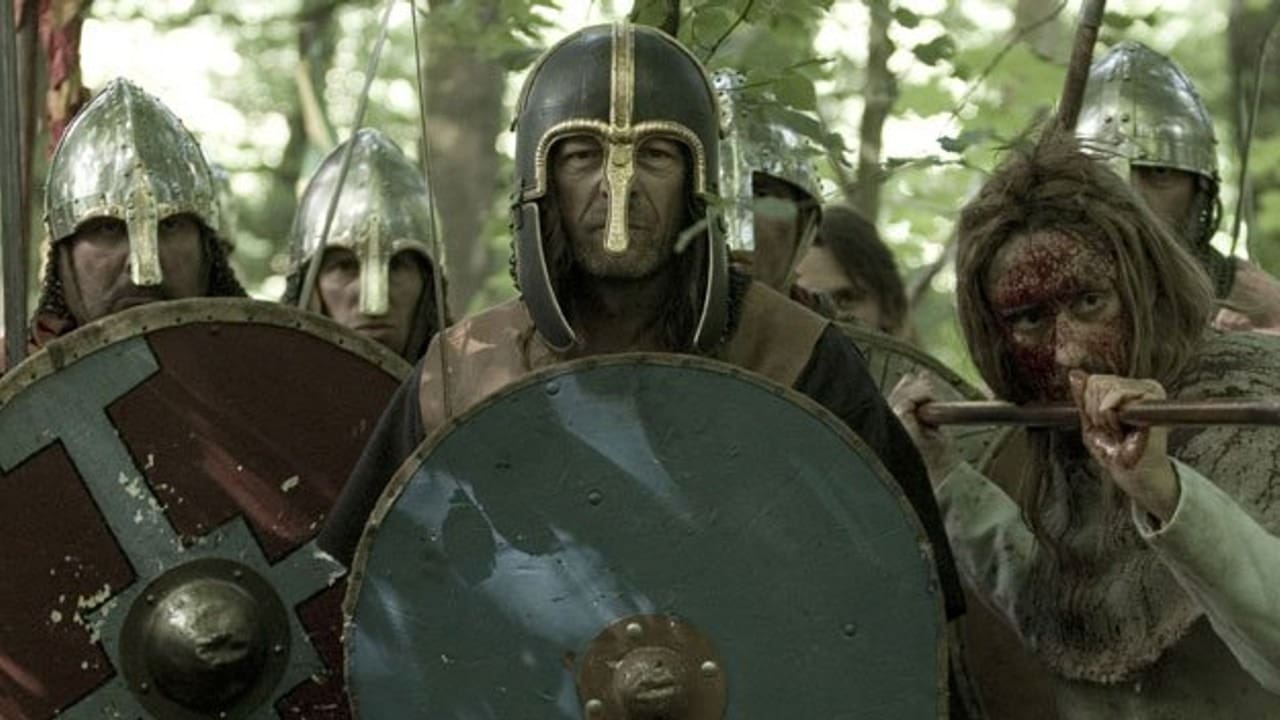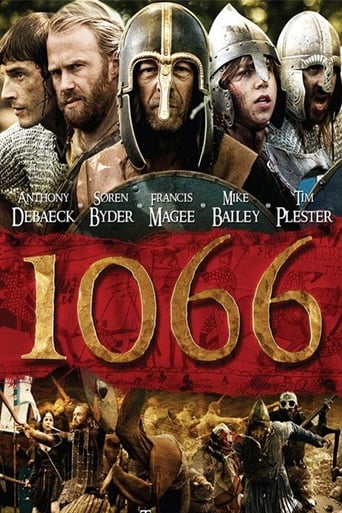

1066: THE BATTLE FOR MIDDLE EARTH is a two-part Channel 4 miniseries that unwisely likens the situation of that year to Tolkien's LORD OF THE RINGS, undoubtedly in a bid to draw in more viewers. My question is: why? There are, I suppose, superficial similarities between the stories, in that rural shires are invaded by enemies, but the effect in whole is to lessen the experience. Why does the film bang on about elves in the wood and orcs when it should really be getting on with telling the story of the three battles of that year? There are some good aspects to be found here. The costumes are authentic and the locales are good too, even if it does look like the whole miniseries was shot in the same forest. The (brief) glimpses we get of Saxon life are intriguing and the recreation of a Saxon village at the opening is promising. Sadly, the film then descends into a load of blokes larking around in the woods, complete with dodgy shaky-cam choreography that really DOESN'T work and a script aimed at the level of soap fans rather than a historical epic.The main problem is the lack of budget, which makes any attempt at depicting the battles of Stamford Bridge or Hastings hopeless; there's no way they can get across the scale and violence of these battles when they're reduced to a few chaps fighting on the edge of a field. Take a classic scene in point: the sole Viking holding the bridge and slaughtering any enemy who approaches him. This is the stuff of legends, yet it's reduced to a fat bloke standing on some wooden planks getting speared by a bad actor. Not good! The frequent quotes and captions that are used to authenticate the story are good, as is Ian Holm's narration. But when they start using maps at the climax to show how the battle at Hastings fared, you wonder whether they'd have been better off making a documentary with staged inserts instead. Certainly the acting is poor, and the use of TV actors explains this. There's no characterisation and no real depth or feeling to what's going on. The tone seems to go all over the place. The Vikings attack, rape and pillage loads of people in the North and are defeated, then one leading Saxon warrior has a crisis of conscience and almost cries when an enemy he's fighting gets impaled. Would he really have acted like this, or would he have hacked his enemy's head off in revenge for the barbarity he's inflicted? I know which one would have really happened. The same goes for the surviving Viking unexplainably joining the Saxons to fight at Hastings.Attempts at humour are lamentable and the efforts to show the battle from all sides only serve to lessen the experience. Sure, the idea of showing epic stuff like this from the 'soldier's eye' view is a good one, but almost everything is done wrongly. The worst bit, for me, is when one group of soldiers form into a 'wedge' to attack the other's shield wall – before the shield wall has even been created! This so-called 'attack' then consists of a group of blokes charging into the others, who instantly break their defensive wall to fight individually. It all turns into a messy scrum, and you wonder if anyone involved had any idea of what they were trying to depict. For a truly authentic account of Saxon warfare, try reading Bernard Cornwell's excellent Saxon stories, beginning with The Last Kingdom. They're set a couple of hundred years before this, but the depiction of Saxon vs. Viking combat far exceeds anything on display here.
... View MoreFor me, this film was a success because it captured that horrified sense of loss not only of a battle, or of lives, but of a whole culture and the 650-year history that had produced it. The decision to focus only on the ordinary foot-soldiers (to the extent that none of the three leaders had a single line to speak, and William did not even appear on screen) was a good one, since it allowed the story to represent the fate of peoples instead of just the fate of kings. The narration, in a good imitation of the style of Anglo-Saxon epic poetry, was mournful and measured, and the revelation of the narrator's identity at the end nicely rounded out one thread of the story. Despite the constant bloodletting, the characters were attractive: Leofric the happy-go-lucky coward who does the right thing in the end; Hrothgar the weary general always trying to rally his weary men for one more fight; and Snorri the captured Viking who becomes a mainstay of the English at Hastings. The final stages at Hastings reminded me of the poem commemorating another English defeat, 75 years before:"Thought shall be harder, heart shall be keener / Spirit shall be greater, as our might lessens." (The Battle of Maldon, 991)
... View More1066 was broadcast with the subheading The Battle For Middle Earth which probably suggests it's marketed to tie in with LORD OF THE RINGS . Unfortunately when this historical drama was broadcast last year many people had forgotten about the film trilogy . Fellowship topped the IMDb top 250 for a couple of months but had rapidly fallen out of the top ten . Of course the books remain popular but you get the impression the producers are clutching at straws hoping that its flaws will go unspotted by a more critical audience . The sad truth is even Stevie Wonder will be able to see what's wrong with this historical mini-series From the outset we see contrived scenes where olde Anglo-Saxon characters state words like " Elves " and a caption flashes up giving the origin of said words . It becomes very tiresome as well as patronising but I guess it saves on the budget . What budget ? Exactly . Through out the running time you're left feeling that the producers have employed an amateur dramatics company and stuck them in someones garden . It's certainly amusing watching the climatic battle scene at Stamford Bridge take place which is at odds with the on screen verbal warning of" 1066 contains graphic and bloody battle scenes " which confused me since a word seems to missing somewhere and the word is " funny " that should appear between after bloody and before battle in the above sentence . The Vikings stand at one end of the bridge while the Saxons stand at the other . Remember in those old Bruce Lee films where the villain is let down by his guards and the guards undergo a trail of combat where they ultimately pay with their lives ? Well the same thing happens here . One after another a Saxon is forced at the front of the queue who gingerly advances up to the Viking who kills him , but not before at least one Saxon has the famous last words of " Stop pushing at the back there " . Honestly if Stamford Bridge was composed of pink tents it wouldn't have been more camp than what's on screen here Unlike me you may not have fallen in love with Peter Jackson's film version of Tolkien's book but you can appreciate the technical achievements and aesthetic beauty he brought to the cinema version . 1066 can show quiet clearly how easy it is to ruin a historical epic if you don't have much of a budget or directorial skills
... View MoreI'm going to give this 9 out of 10 - only because I'm unsure how exactly historically accurate this was - but it WAS about 90% accurate. I'm also knocking some off for being a little strangely anti-norman - I'm not sure exactly what that was all about, but I'll explain this.However, first of all - who ever is wondering why there are no Lord of the Rings elves or wizards - this is a HISTORICAL DOCUMENTARY. Its not a fantasy, and it portrays the MIDDLE AGES (though why the History Channel calls it "Middle Earth" is a little strange). I'm also unsure with the "Orc" references - it seemed a little bit of a stretch and lots of wikipedia editing it seems to get those references.However, as a student of the run-up to the Battle of Hastings, I found the movie entertaining and certainly an interesting perspective. There are a number of books - one of which is called "1066 the Battle of Hastings" which talks about the battle in the perspective of an average commoner of Anglo-Saxon England - and to be honest I was hoping for a little more of that perspective BEFORE the battles. But I guess that would have made the movie a little longer and a little drier.Now, the battle scenes aren't exactly totally gruesome - but they are gruesome enough. What comes across is that this is a violent time and men were thrust into battle with very little training or expectation of what to expect.Not sure with the portrayal of either of the Kings - one wasn't even shown, and the other was really very strange - a little too fantasy-like...OK - spoiler alert, for those who don't know the history of England and Great Britain...Yes, the Normans were French. Yes, they invaded and beat the Anglo-Saxons. Yes, they were brutal and "laid waste" villages and towns. Yes, they ended up "owning huge tracts of land for the next thousand years" etc etc But what was PAINFULLY missing from this documentary was the fact that the Norman Invaders became so INTEGRATED with Anglo-saxons that within one lifetime, England was changed forever. What was missing was the fact that prior to 1066, England was a number of warring shires - and that William, by conquering Britain, united the people under a single banner and created the first true monarchy of England, which links the British Monarchy for the next 1,000 years. What was missing was the fact that 1066 was the last time anyone successfully invaded England - that all technology, tools and foundations of defense stemmed directly from this new "invader".I missed the politics of what led up to the Battle of Hastings. What should have occurred was that they should have followed the tapestry from beginning to end. I was saddened to not see Halleys Comet even make an appearance in the movie (one of the most important "portents" and one which was in the Bayeaux Tapestry).I'm giving this a high mark, because more historical based movies should be made - knowing where we come from is always important. But, like my old history master used to say on my report card "could do better"...
... View More